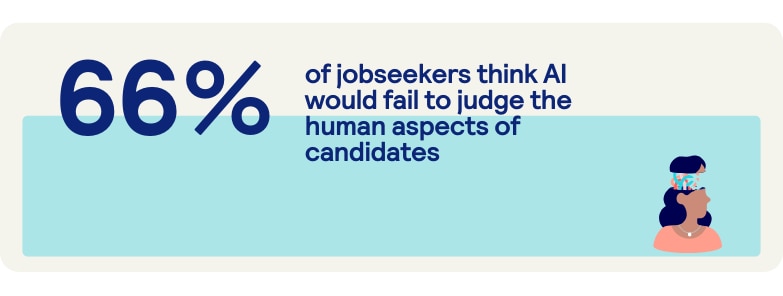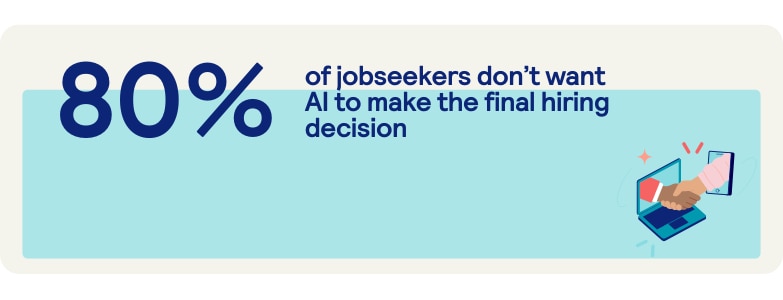
AI vs. Human – Jobseekers think AI shouldn’t make hiring decisions
Table of Contents
- Key findings
- How familiar are workers with AI?
- What are the implications of AI for workers?
- The human factor in recruitment
- AI and bias in recruitment
- Recommendations for employers and recruiters
There is clearly excitement around AI, but people are wary when it comes to its power.
Most people aren’t yet clued in on all its applications, but we’ve already been using AI in our daily lives for the past few years. Facial recognition systems, suggested text and messages, voice assistants on smartphones, content recommendations on social media apps all use it.
AI is making our lives easier and businesses more efficient, but it raises questions about the future of work and humanity. In a previous article, we looked at how UK workers perceived AI’s use at work and in recruitment. The verdict was… divided.
People were generally happy to use AI for work, and excited about the opportunities it would bring. Yet, when it came to their recruitment, they ideally preferred a human to make the hiring decision.
To see if this sentiment is shared by jobseekers outside of the UK, we compared our findings with research from US and Germany. We found that jobseekers largely have similar thoughts toward AI’s use in recruitment.
About 3 in 4 people in the UK, US and Germany think AI shouldn’t be making hiring decisions. Our findings help explore why in detail.
Key findings
- Most people in the UK, US and Germany have heard of AI, but say they haven’t used it yet.
- People in the UK are more comfortable about using AI at work than those in Germany (56% vs. 46%)
- Jobseekers in Germany are a lot more excited than UK jobseekers about the future opportunities and innovations that AI will bring to their industry (72% vs. 40%).
- About 2 in 5 workers are concerned about AI’s implications. For example, about half of UK workers think AI might eventually replace them, compared to around one third (36%) of workers in Germany. Meanwhile, around a third (32%) of the American public think AI will hurt more than help them.
- People in the UK and Germany have similar concerns when it comes to using AI in recruitment. Most think AI won’t be able to pick up blind spots, it will be too impersonal and raise ethical concerns around privacy and data protection etc. Workers in the US agree that AI will lack the ‘human factor’ in hiring.
- As a result, majority of workers in the UK, US and Germany think AI shouldn’t have the final say in hiring a candidate.
How familiar are workers with AI?
Before asking workers about AI, each study explored how familiar they are with it. Overall, most people said they have heard of AI, but haven’t used it themselves. Over two in five (43%) workers in Germany and half (50%) in the UK said they have either never heard of AI, or they have heard of it but haven’t used it. Comparably, about 3 in 5 US adults (58%) said they were familiar with ChatGPT, though only 14% had tried it, while 42% never heard of ChatGPT.
What are the implications of AI for workers?
Workers in the UK, US and Germany are divided about how AI may affect them.
When asked about the pros and cons of AI – such as its potential to significantly enhance productivity versus eradicating jobs – workers gave similar views, though those in Germany came across more optimistic because the majority think AI will increase productivity (63% vs 54% in the UK).
In the US, when asked about potentially beneficial or harmful effects of AI in workplaces in the next 20 years, a higher share said it will hurt more than help workers. About a third of Americans (32%) think the benefits and harms will be equally split for workers generally, while around 1 in 5 (22%) is unsure about its potential impact.
Responses from workers in Germany and the UK point out to the need for more investment into AI technology and training for workers. More workers in Germany (51%) say their employer isn’t using AI technology effectively to increase productivity and performance, compared to UK workers (46%).
In addition, similar portion of workers say their employer doesn’t invest in training and development to help them use AI. (62% of workers in Germany vs. 50% in the UK).
The human factor in recruitment

The obvious answer as to why jobseekers don’t want AI to make final hiring decisions is… Because it’s not human.
People think AI would fail at recognising the more human aspects of candidates; such as culture fit, soft skills, and personality.
Most workers in the UK and Germany think AI won’t be able to pick up blind spots, process human emotions or distinctive features such as accents like a human. Similar to the UK and Germany, most workers in the US state ‘the lack of human factor’ as the reason they wouldn’t apply for a job where AI is used in recruitment.

Here’s a breakdown of our findings:
- 70% of workers in Germany think AI will be too impersonal and won’t be able to process human emotions or accents/dialects, vs. 66% of UK workers
- 3 in 5 workers in Germany have ethical concerns, such as protection of privacy and data, vs. 54% in the UK
- 2 in 3 workers in the US who would not apply for a job where AI is used in hiring state ‘the lack of human factor’ as the reason
- Most Americans (71%) don’t want AI to make the final hiring decision, however they are more open to it than workers in UK and Germany. (84% UK workers vs. 75% in Germany)
- 31% of workers in Germany are okay with AI playing a small role in the recruitment process. Whereas just over half (52%) of UK workers prefer AI to play only a small part in the recruitment process
We’ve seen in previous studies that a competent, responsive hiring manager is the key to a great candidate experience during the hiring process. So, it’s no surprise that jobseekers are concerned about AI removing the human touch from recruitment.
At the same time, the majority think AI raises ethical concerns around privacy and data protection. Consequently, around 2 in 3 (64%) workers in Germany and almost half (49%) in the UK think it should be mandatory for companies to be transparent about how and why they use AI in the hiring process.
Interestingly, people in the US have more faith in AI when it comes to treating applicants equally. Almost half (47%) of respondents said AI could remove bias, compared to 42% in the UK and 37% in Germany.
AI and bias in recruitment
People see the value of AI for unbiased, objective and data-driven decision-making. However, AI hasn’t entirely eradicated unintentional bias from the recruitment process yet.
Workers in the UK and Germany are roughly fifty fifty when asked if AI will make workplaces more inclusive and diverse or enhance inequalities and biases.
On the contrary, more people in the US believe that greater use of AI by employers would make things better rather than worse in the hiring and worker-evaluation process. US workers think AI would be better than humans in treating applicants equally (47%) but would struggle with seeing the potential in candidates.
Among those who see racial and ethnic bias as a problem in hiring, over half (53%) think bias and unfair treatment based on race and ethnicity will improve as employers increasingly use AI in recruitment.
Recommendations for employers and recruiters
Integrate AI into your hiring, but maintain the human touch
Jobseekers are generally open to the use of AI in recruitment if it automates stages that don’t involve critical thinking. However, they expect to interact with a person when it comes to who interviews them, assesses their skills, and makes the final hiring decision.
By combining the strengths of AI with human judgment and empathy, employers and recruiters can provide a personalised and engaging recruitment experience.
Educate and upskill workers to use AI
About half of workers have never used AI and even less say they are comfortable using it. Employers who want to implement AI should consider educating their workforce on how these technologies work and improve business functions.
At the same time, employers can introduce workers to AI tools related to their role and offer training in leveraging it. This will improve the perception of AI, soothe hesitations about its use and save workers time on their tasks.
Be transparent about how you use AI in recruitment
Overall, people are unsure of the impact of AI in the recruitment process. This is due to them not being aware how exactly AI is used in selecting them. By letting candidates know which stages use AI and how, employers can alleviate concerns and build trust.
Providing feedback to candidates can reassure them as well. As most people express concerns about data collection and privacy regarding AI, it’s also important for employers to convey how candidate data is collected and used in an AI-powered recruitment process.
Evaluate and monitor AI systems
Continuously training, testing and monitoring AI systems is essential in making sure they are unbiased, ethical and safe. Employers and recruiters should define evaluation metrics, assess data, collect feedback, and implement safeguards to protect data and privacy, eliminate bias and improve AI systems.
Under current laws, human oversight for hiring decisions is also required for compliance.
About the research
The UK survey was conducted by Totaljobs between 26 April – 9 May 2023. The sample consisted of 2,002 respondents who work full-time or part-time in the UK (aged 18+).
The survey for Germany was conducted by The Stepstone Group between 15 May – 6 June 2023. The sample consisted of 3,000 respondents who work full-time or part-time in Germany (aged 18+).
To compare our findings with the US, we used Pew Research Center’s study on “AI in Hiring and Evaluating Workers: What Americans Think”, which surveyed 11,004 U.S. adults from 12 – 18 December 2022. As well as a short analysis on the use of ChatGPT based on a survey done between 13 – 19 March 2023.
Explore articles
Receive the latest recruitment resources and
advice to boost your hiring
By providing us with your details you agree to our privacy policy and for us to keep you updated with the latest news, events,
and special offers from Totaljobs.






